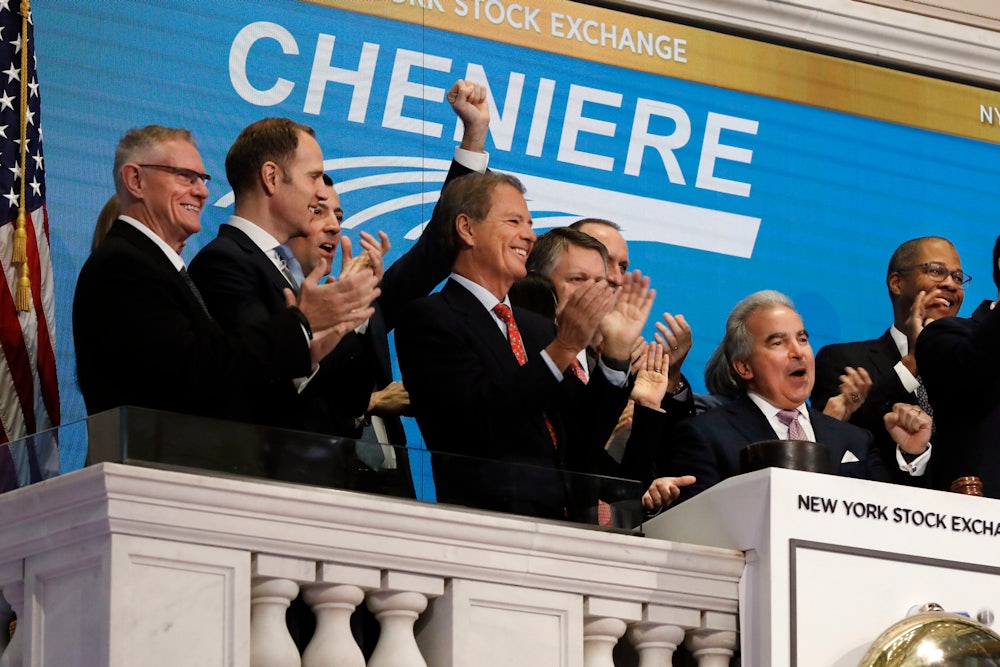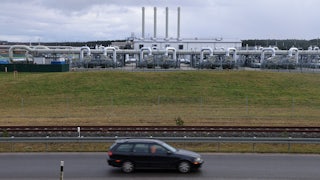The winners of Vladimir Putin’s cruel, imperialist war on Ukraine are few and far between. But some of them could be found on an upbeat earnings call held Thursday by Cheniere, America’s largest exporter of liquefied natural gas, or LNG, whose stock jumped 7.6 percent as markets opened just hours after Russia’s invasion began.
“It’s tragic what’s going on in Eastern Europe, and it saddens me to see the satellite images on the newscreen that we’ve all witnessed this morning,” Cheniere President and CEO Jack Fusco said, responding to JP Morgan analyst Jeremy Tonet’s question about the company’s prospects on the continent in light of the conflict. “But if anything, these high prices, the volatility, drive even more energy security and long-term contracting.”
Fusco appears to have been referring to his industry’s desire for extended gas-supply deals in Europe, which have been harder to come by as the continent begins moving away from fossil fuels. Times haven’t been too tough, though: Cheniere reported a record $15.9 billion in revenue last year. “The fact that there’s scarcity of LNG these days,” Fusco continued, “is driving more and more conversation on how to increase our infrastructure and secure long-term contracts for our European customers.”
Anatol Feygin, the company’s vice president and chief commercial officer, noted that Cheniere’s tankers are well positioned to supply Europe—“a key part of the solution going forward.” He added that the “human toll and tragedy obviously has our thoughts and prayers.”
Russia meets about a third of Europe’s energy demand. There is a real threat—not yet acted upon—that Putin could turn off the taps as retaliation for Western sanctions, or for some other reason entirely. U.S. LNG producers have already been selling more gas to Europe in recent months at elevated prices. Those prices are in part a result of Putin already constraining eastward gas flows, but also due to cold weather and surging global demand as more countries ease lockdown restrictions. For the first time ever last month, the United States exported more gas to Europe than Russia delivered to the continent via pipeline.
That U.S. fossil fuels are and will continue being tapped to fill gaps in European energy supplies isn’t all that controversial. What companies seem especially eager for, though, is the potential to ink long-term deals and greenlight infrastructure that could stay online for decades to come. On the Cheniere call, Bernstein analyst Jean Ann Salsbury brought up a recent European Commission proposal to ban long-term contracts for “unabated” gas with non-E.U. countries that would last beyond 2049. According to Salsbury, that prospect has placed a chill on European utilities’ willingness to sign longer-term deals. Such contracts send a positive signal for additional exploration, development, and infrastructure build-outs.
/ In honor of Earth Day, Apocalypse Soon content is free to registered users until April 29. Start reading now.
“Europe is, we think, evolving in a healthy direction now after some meaningful challenges that were a function of regulatory compacts and the kind of Brussels direction,” Feygin replied. “We’ve had some success with mid-term and long-term deals that were on the 10- to 15-year range. We expect to see more of that traction going forward.” He said it’s “too early to tell” whether 20-plus years are in the offing, adding, “but given the recent developments, I think the trend is in the right direction, and clearly we’ve demonstrated our ability to meet their objectives, in terms of having the right environmental credentials for our product, as well.”
Wednesday night, the American Petroleum Institute tweeted out a thread of demands for the Biden administration to “ensure energy security at home and abroad,” including to scale up leasing for oil and gas development on public lands, accelerate permitting for new infrastructure, and “reduce legal and regulatory uncertainty.” A statement from API CEO Mike Sommers condemning Russia’s invasion on Thursday made sure to mention that “American natural gas and oil producers have a critical role to play in supporting our European allies with access to a stable supply of reliable and affordable energy.”
API is walking a tricky line. Some of its biggest members have long-standing ties to Russian oil and gas interests. BP, which has made a show of its low-carbon commitments over the last few years, owns nearly a fifth of Russia’s largest oil company, Rosneft. As Reuters reported, API argued against more stringent sanctions for fear that they could “limit potential harm to the competitiveness of U.S. companies.” For now, the Biden administration has opted not to include Rosneft, or Russia’s energy sector in general, in its sanctions.
As journalist Adam Johnson points out in his newsletter, The Column, Republicans have adopted the line that a “green agenda” and the White House’s alleged “war on American oil and gas” (per Marco Rubio) are to blame. When Biden “canceled the Keystone pipeline on day one of his presidency he sent a clear message to Putin: You go ahead, develop your energy supply,” South Dakota Governor Kristi Noem said on Fox News. “Make sure that the rest of Europe and the United States is more unstable. From the very day he got into the White House, he gave Putin all the power.” Colorado Congresswoman Lauren Boebert posted a shaky video exhorting the country to “regain our energy independence, and also take immediate steps to export far more of our clean, liquid natural gas to our European allies.”
But GOP lawmakers aren’t the only ones who see this crisis as cause to further expand America’s prodigious oil and gas production. Journalist Matt Yglesias tweeted that the administration should “reach out to GOP leaders to discuss ideas (loan guarantees? a minimum price?) to spur a more rapid increase in domestic fracking,” and The Atlantic’s David Frum noted that “under President Biden’s leadership, the United States remains the world’s number one producer of both oil and natural gas—and a net exporter of both. US is firmly energy independent, and can help allies.”
In Bloomberg, Karl W. Smith wrote that fracking “may be America’s most powerful weapon against Russian aggression,” echoing API’s demands to open more federal lands to oil and gas drilling and calling for a massive additional subsidy for companies that expand drilling. By their own account, drillers aren’t keen to oversee surging production. Pioneer Natural Resources Co., Devon Energy Corp. and Continental Resources Inc. have pledged to limit 2022 production increases at 5 percent. “Higher oil prices strengthen the Russian economy and weaken Western Europe’s,” Smith wrote, but U.S. oil and gas companies have been plenty happy to see prices climb. The White House has few tools to convince them to drill more—and showering executives with even more giveaways probably won’t, either, especially given that the U.S. is already producing oil at close to its limits.
On Wednesday, the International Energy Agency reported that energy-sector emissions of methane—a greenhouse gas ubiquitous to gas supply chains that is more than 80 times as potent as carbon dioxide over the short term—are roughly 70 percent higher than officially reported figures. The world’s top two leaders in methane emissions are Russia and the U.S., respectively. That seems unlikely to change no matter how the conflict in Ukraine plays out, as companies such as Cheniere find a profitable silver lining in suffering—by deepening Europe’s dependence on fossil fuels and locking in emissions for decades to come.






